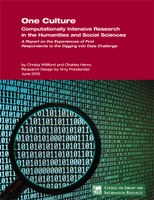
Number 87 • May/June 2012
ISSN 1944-7639 (online version)
Contents
Report Examines Computationally Intensive Research in the Humanities and Social Sciences
E-Science Institute Slated for Fall
Lisa Spiro, Korey Jackson Join Anvil Academic
Sharon Ivy Weiss Appointed CLIR Chief Operations Officer
Jodi Schneider Awarded 2012 Zipf Fellowship
CLIR Issues is produced in electronic format only. To receive the newsletter electronically, please sign up at https://www.clir.org/pubs/issues/signup.html. Content is not copyrighted and can be freely distributed.
Follow us on Twitter @CLIRNews
Report Examines Computationally Intensive Research in the Humanities and Social Sciences

A new report from CLIR, One Culture. Computationally Intensive Research in the Humanities and Social Sciences, explores how big data is changing the research landscape for these disciplines. The report is the first public appraisal of the Digging into Data Challenge, an international grant program first funded by the US National Endowment for the Humanities (NEH), the US National Science Foundation, the Joint Information Systems Committee (JISC) in the United Kingdom, and the Canadian Social Sciences and Humanities Research Council.
“As recently as 20 years ago, social science researchers typically used analog resources and some computational analysis of data collected in a laboratory or in the field, while humanists worked predominantly with library and archival materials,” notes the report. Today, scholars in these disciplines are increasingly using massive databases of materials that range from digitized books, newspapers, and music to transactional data such as web searches, sensor data, or cell phone records. “One Culture helps us to see not only why we would want a computer to assist us with our work, but how big data is changing the very nature of traditional humanistic research,” said Brett Bobley, chief information officer and director of the NEH Office of Digital Humanities, and leader of the Digging into Data Challenge.
In 2009, its first year, the Digging into Data Challenge made awards to eight teams of scholars, librarians, and computer and information scientists. The range of disciplines represented in the projects included classical and medieval literatures, British and American histories, the history of European cartography, nineteenth- and twentieth-century popular music, the study of British and American speech, and the application of advanced computer algorithms for pattern recognition in digital images.
Over the following two years, report authors Christa Williford and Charles Henry conducted site visits, interviews, and focus groups to understand how these complex international projects were being managed, what challenges they faced, and what project teams were learning from the experience. Their findings are presented in the report, along with a series of recommendations for researchers, administrators, scholarly societies, academic publishers, research librarians, and funding agencies. The recommendations are “urgent, pointed, and even disruptive,” write the authors. “To address them, we must recognize the impediments of tradition that hinder the contemporary university’s ability to adapt to, support, or sustain this emerging research over time.”
The report’s recommendations are as follows:
- Expand our concept of research
- Expand our concept of research data and accept the challenges that digital research data present
- Embrace interdisciplinarity
- Take a more inclusive approach to collaboration
- Address gaps in training
- Adopt models for sharing credit
- Adopt models for sharing resources
- Re-envision scholarly publication
- Make greater, sustained investments in human and cyberinfrastructure
The report is available online at www.clir.org/pubs/reports/pub151 and print copies may also be ordered from the site. Case studies, not included in the print or pdf versions, are available in html format at the same url.
CLIR Inaugurates Blog Series
We invite you to check out our new blog series, “Re: Thinking.” The weekly blog will feature perspectives from a variety of contributors on topics relating to the emerging digital environment, research, and higher education. Chuck Henry’s inaugural blog frames the series and highlights findings from the new report, One Culture.
We welcome your comments! The blog is openly available on CLIR Connect, but to comment, you’ll need to sign in. Once you are signed in, you may also request RSS feeds to the blog by going to your profile and clicking “My RSS Feeds” and specifying “Re:Thinking.”
If you have never visited CLIR Connect and don’t have an account, or if you have lost your username or password, click here.
E-Science Institute Slated for Fall
CLIR’s Digital Library Federation (DLF) program is partnering with the Association for Research Libraries (ARL) and DuraSpace to offer the ARL/DLF/DuraSpace E-Science Institute October 2012–January 2013. The institute will be open to academic and research library audiences seeking opportunities to boost institutional support of e-research and the management and preservation of our scientific and scholarly record.
The 2012 institute will build on the strengths of the inaugural 2011 E-Science Institute developed by MacKenzie Smith, DeEtta Jones, and a group of expert faculty in collaboration with ARL and DLF. That institute was designed to help research libraries develop a strategic agenda for e-research support, with a focus on the sciences. The institute consisted of a series of interactive modules that took small teams of individuals through a dynamic learning process to strengthen and advance their strategy for supporting computational scientific research.
ARL members and CLIR sponsors were surveyed about the anticipated 2012 institute design. Respondents indicated a preference for a format that would include a series of online courses as well as an optional in-person capstone event. This year’s institute will offer an additional focus on humanities as well as the sciences plus in-depth presentations in areas that participants indicated were of high interest.
Announcements about specific dates and registration information will be posted later this summer. To receive notification when registration opens, sign up at http://duraspace.org/e-science-institute.
Lisa Spiro, Korey Jackson Join Anvil Academic
-
Sprio
CLIR joins the National Institute for Technology in Education (NITLE) in welcoming Lisa Spiro and Korey Jackson to the staff of Anvil Academic, a digital publisher for the humanities formed earlier this year by the two organizations.
Spiro will serve as program manager, directing production of Anvil titles and overseeing technical staff and technical resources. She will work with Anvil Editor Fred Moody in preparing, optimizing, and finalizing Anvil titles for publication, in building the Anvil production and display system, and in collaborating with other institutions in distributing and preserving Anvil titles. Spiro, who is director of NITLE Labs, will continue to serve concurrently in that position.
Jackson, the recipient of a 2012 Public Fellows Award from the American Council of Learned Societies, will serve as program coordinator and analyst for Anvil starting August 1. His responsibilities will include research and evaluation of publishing platforms, helping build prototypes, assisting with title production on prototype platforms, and serving as liaison with participating member institutions. Jackson is currently a CLIR Postdoctoral Fellow at the University of Michigan’s MPublishing.
Anvil Academic will focus on publishing new forms of scholarship that cannot be adequately conveyed in the traditional monograph. Works published through Anvil will be available through Creative Commons licenses on the Web and as apps on portable devices. The title production system will be developed jointly by NITLE and CLIR for use by other institutions, each of which will have the opportunity to publish under its own imprint. It is expected that Anvil will publish its first title in early 2013.
Sharon Ivy Weiss Appointed CLIR Chief Operations Officer
 Sharon Ivy Weiss has been appointed Chief Operations Officer for CLIR. The position, which is new for the organization, will encompass financial management and oversight, human resources, operations, and grant development.
Sharon Ivy Weiss has been appointed Chief Operations Officer for CLIR. The position, which is new for the organization, will encompass financial management and oversight, human resources, operations, and grant development.
Ivy Weiss has served as CLIR’s financial officer for three years. She received her Bachelor of Science in Accounting from the University of North Carolina at Charlotte and, after working in public accounting and auditing for two years, has spent the last 15 years as a financial manager in the nonprofit sector.
“We are delighted that Sharon will be leading CLIR’s operations and working with us on program-focused strategic planning in accordance with our vision and mission,” said CLIR President Chuck Henry.
Jodi Schneider Awarded 2012 Zipf Fellowship

Jodi Schneider, a Ph.D. candidate in the Digital Enterprise Research Institute at the National University of Ireland in Galway, has been selected to receive the A. R. Zipf Fellowship in Information Management for 2012. She holds a bachelor’s degree in the Great Books from St. John’s College and a master’s degree in mathematics from the University of Texas at Austin, as well as an MSLIS from the University of Illinois, Urbana-Champaign.
Schneider’s research focuses on information management and knowledge representation of contested information from social media. The goal of her research is to extend sentiment analysis and information retrieval techniques in order to provide representations and retrieval strategies for contentious issues. She has developed a global architecture for extracting, integrating, and reusing online arguments using semantic web technologies. Her architecture is being piloted with contentious decisions on Wikipedia. She has already described how and why Wikipedia editors delete topics from the encyclopedia.
CLIR manages the award, which is named in honor of A. R. Zipf, a pioneer in information management systems. The $10,000 fellowship is awarded annually to a student who is enrolled in graduate school in the early stages of study and shows exceptional promise for leadership and technical achievement in information management. For more information and a list of previous fellowship recipients, visit https://www.clir.org/fellowships/zipf/zipf.html.
Coming Soon…
Core Infrastructure Considerations for Large Digital Libraries, by Geneva Henry
Examination of Data Curation Practice and Education, studies by Lori Jahnke/Andrew Asher and Spencer Keralis


